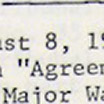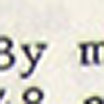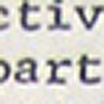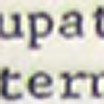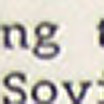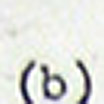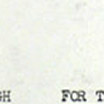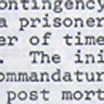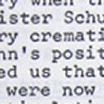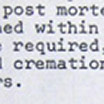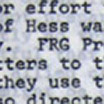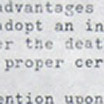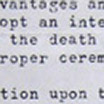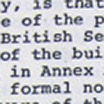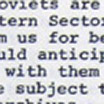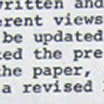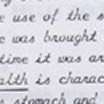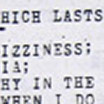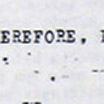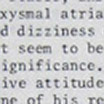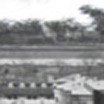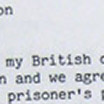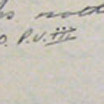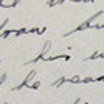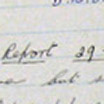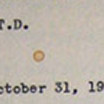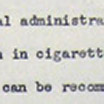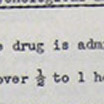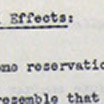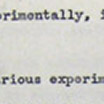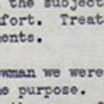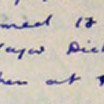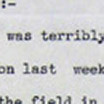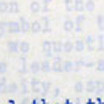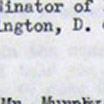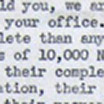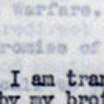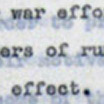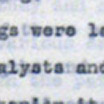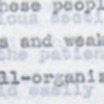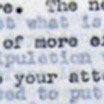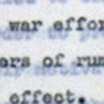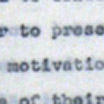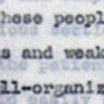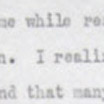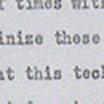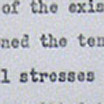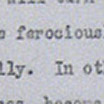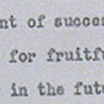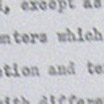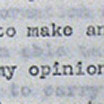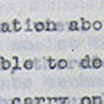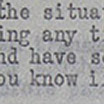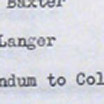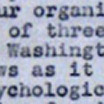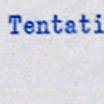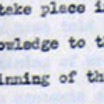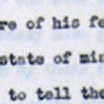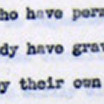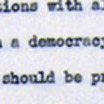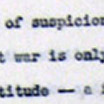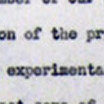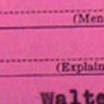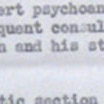National Archives and Records Administration, Washington
Document | Description |
The following documents are from a State department document from 1969 [declassified], reviewing Hess' health, after a duodenal ulcer, and considering arrangements in the event of his death and future policy on Spandau Prison. | |
State department document from 1969 [declassified], reviewing Hess' health. 2 | |
State department document from 1969 [declassified], reviewing Hess' health. 3 | |
State department document from 1969 [declassified], reviewing Hess' health. 4 | |
State department document from 1969 [declassified], reviewing Hess' health. 5 | |
State department document from 1969 [declassified], reviewing Hess' health. 6 | |
State department document from 1969 [declassified], reviewing Hess' health. 7 | |
State department document from 1969 [declassified], reviewing Hess' health. 8 | |
State department document from 1969 [declassified], reviewing Hess' health. 9 | |
State department document from 1969 [declassified], reviewing Hess' health. 10 | |
State department document from 1969 [declassified], reviewing Hess' health. 11 | |
State department document from 1969 [declassified], reviewing Hess' health. 12 | |
State department document from 1969 [declassified], reviewing Hess' health. 13 | |
State department document from 1969 [declassified], reviewing Hess' health. 14 | |
Briefing document, US government, on 'the Hess problem' [i.e. how to deal with his death] (11 July 1975). Issues discussed include inter-governmental tensions between 4 powers, risk of creation of a Nazi shrine if Hess's ashes were to be buried on the site and so on. It is proposed that only immediate family (not 'friends') be allowed to attend any service at the crematorium. | |
Briefing document, US government, on 'the Hess problem' [i.e. how to deal with his death] (11 July 1975). 2 | |
Briefing document, US government, on 'the Hess problem' [i.e. how to deal with his death] (11 July 1975). 3 | |
Briefing document, US government, on 'the Hess problem' [i.e. how to deal with his death] (11 July 1975). 4 | |
Briefing document, US government, on 'the Hess problem' [i.e. how to deal with his death] (11 July 1975). 5 | |
Briefing document, US government, on 'the Hess problem' [i.e. how to deal with his death] (11 July 1975). 6 | |
Briefing document, US government, on 'the Hess problem' [i.e. how to deal with his death] (11 July 1975). 7 | |
Further US documents (from 1975), relating to arrangements for Hess' release, future funeral etc. 1 | |
Further US documents (from 1975), relating to arrangements for Hess' release, future funeral etc. 2 | |
Further US documents (from 1975), relating to arrangements for Hess' release, future funeral etc. 3 | |
Further US documents (from 1975), relating to arrangements for Hess' release, future funeral etc. 4 | |
Further US documents (from 1975), relating to arrangements for Hess' release, future funeral etc. 5 | |
Documents from US to French Embassy, regarding Hess (8 February 1982). 1 | |
Documents from US to French Embassy, regarding Hess (8 February 1982). 2 | |
Documents from US to French Embassy, regarding Hess (8 February 1982). 3 | |
Documents from US to French Embassy, regarding Hess (8 February 1982). 4 | |
Plan of Spandau prison. | |
The following documents contain a State Dept. correspondence about Hess' potential release, Russian opposition, the prisoner's health (medical reports are attached in this bundle). Memo dated 3 September 1982. Hess' own translated bulletin about his health and age (part of his petition for release). At this stage he was 88. Hess declares his desire to spend his remaining time with his family and grandchildren. He offers to remain silent on any subject (he knows not what) specified by the authorities and to refrain from political activity (a prospect he deems anyway absurd, given his age). The note discusses his heart attacks, oedema, blindness in one eye, cataract in the other, heart attacks, muscular atrophy, dizziness, serious hernia etc. | |
State Dept. correspondence about Hess' potential release. 2 | |
State Dept. correspondence about Hess' potential release. 3 | |
State Dept. correspondence about Hess' potential release. 4 | |
State Dept. correspondence about Hess' potential release. 5 | |
State Dept. correspondence about Hess' potential release. 6 | |
State Dept. correspondence about Hess' potential release. 7 | |
State Dept. correspondence about Hess' potential release. 8 | |
State Dept. correspondence about Hess' potential release. 9 | |
Photograph of Spandau Prison. 1 | |
Photograph of Spandau Prison. 2 | |
Letter (15 September 1986), from the US Command, HQ, Berlin, regarding Hess' property, security around Spandau and the theft of Hess' property. | |
Letter (15 September 1986), from the US Command, HQ. pt 2 | |
Memo (1 October 1986), from US legal advisor, Donald Koblitz, to General Mitchell, on Spandau, security, and the unauthorised taking of a photo of Hess and also discussing Hess' health problems. | |
Letter from William Halpin, assistant deputy chief of staff, US (intelligence), on Hess and security, question (1 October 1986). 1 | |
Letter from William Halpin, assistant deputy chief of staff, US (intelligence), on Hess and security, question (1 October 1986). 2 | |
Hand-written medical reports concerning Hess (October 1941). 1 | |
Hand-written medical reports concerning Hess (October 1941). 2 | |
Hand-written medical reports concerning Hess (October 1941). 3 | |
OSS briefing notes to Donovan, about the possibility of using drugs in the interrogation of PoWs, memo (4 June 1943 and 21 June. These refer to the deliberations of a committee established under the auspices of the National Research Council, at the request of psychological warfare branch of M.I.S. Various professors of psychiatry (Overholser, Whitehorn, Stricker) as well as Dr Lawrence S. Kubie, associate in neurology at the Neurological Institute, New York City, (Kubie was later to have a substantial career as a psychoanalyst) and accompanying technical experts, were involved in the committee. The first experiments, we are told here, were conducted on US volunteers, using mescaline. | |
OSS briefing notes to Donovan, about the possibility of using drugs in the interrogation of PoWs, memo (4 June 1943 and 21 June 1943). 2 | |
OSS briefing notes to Donovan, about the possibility of using drugs in the interrogation of PoWs, memo (4 June 1943 and 21 June 1943). 3 | |
OSS briefing notes to Donovan, about the possibility of using drugs in the interrogation of PoWs, memo (4 June 1943 and 21 June 1943). 4 | |
OSS briefing notes to Donovan, about the possibility of using drugs in the interrogation of PoWs, memo (4 June 1943 and 21 June 1943). 5 | |
OSS briefing notes to Donovan, about the possibility of using drugs in the interrogation of PoWs, memo (4 June 1943 and 21 June 1943). 6 | |
OSS briefing notes to Donovan, about the possibility of using drugs in the interrogation of PoWs, memo (4 June 1943 and 21 June 1943). 7 | |
OSS briefing notes to Donovan, about the possibility of using drugs in the interrogation of PoWs, memo (4 June 1943 and 21 June 1943). 8 | |
OSS briefing notes to Donovan, about the possibility of using drugs in the interrogation of PoWs, memo (4 June 1943 and 21 June 1943). 9 | |
Extracts from notebooks kept by medical orderlies who cared for Rudolf Hess in Britain during the war. 1 | |
Extracts from notebooks kept by medical orderlies who cared for Rudolf Hess in Britain during the war. 2 | |
Extracts from notebooks kept by medical orderlies who cared for Rudolf Hess in Britain during the war. 3 | |
Document listing OSS Payment to Walter Langer, 1943. 1 | |
Document listing OSS Payment to Walter Langer, 1943. 2 | |
Letter from Walter Langer to Lieut. Dolan, OSS (14 December 1943) regarding payment arrangements for his study of Hitler. | |
Memo from Psychology Division, Coordinator of Information (23 December 1941), regarding a proposal for a psychological offensive against Hitler, as proposed by the Committee for National Morale. The memo cites Walter Langer's opinions that Hitler is a paranoiac, and asks for more details before committing $2500 to an endeavor to destabilize Hitler himself through propaganda. | |
Memo from Psychology Division, Coordinator of Information (23 December 1941). cont'd | |
Letters to Donovan, and other officials, from Committee for National Morale (20 December 1941), including letters from Arthur Upham Pope, offering to provide psychological profile of Hitler, a database of Nazi party members and to secure the contribution of a criminologist for these Nazi studies (namely Professor von Hentiig, described here as 'perhaps one of the greatest criminologists living'. | |
Letters to Donovan, and other officials, from Committee for National Morale (20 December 1941). 2 | |
Letters to Donovan, and other officials, from Committee for National Morale (20 December 1941). 3 | |
Letter from William to Walter Langer (14 December 1942), regarding a report by Walter to Donovan (that William says he 'polished up). | |
Letter from William Langer to Donovan, regarding Walter's report (14 November 1942). It includes the line: 'I am personally convinced that psychological warfare operations can be strengthened by bringing in people in the psychoanalytic field'. | |
Report from Walter Langer to Donovan (13 November 1942), setting out the case for a psychoanalytical input into psychological warfare operations. Through psychoanalysis, the aim is to incapacitate the will and mind of the enemy, to put it into 'state of confusion, distrust, anxiety or fear', thereby to 'immobilize him for effective action'. No rational appeal, he argues, can possibly work. | |
Report from Walter Langer to Donovan (13 November 1942). 2 | |
Report from Walter Langer to Donovan (13 November 1942). 3 | |
Report from Walter Langer to Donovan (13 November 1942). 4 | |
Report from Walter Langer to Donovan (13 November 1942). 5 | |
Report from Walter Langer to Donovan (13 November 1942). 6 | |
Report from Walter Langer to Donovan (13 November 1942). 7 | |
Report from Walter Langer to Donovan (13 November 1942). 8 | |
Report from Walter Langer to Donovan (13 November 1942). 9 | |
Report from Walter Langer to Donovan (13 November 1942). 10 | |
Report from Walter Langer to Donovan (13 November 1942). 11 | |
Report from Walter Langer to Donovan (13 November 1942). 12 | |
Report from Walter Langer to Donovan (13 November 1942). 13 | |
Report from Walter Langer to Donovan (13 November 1942). 14 | |
Report from Walter Langer to Donovan (13 November 1942). 15 | |
Report from Walter Langer to Donovan (13 November 1942). 16 | |
Report from Walter Langer to Donovan (13 November 1942). 17 | |
Report from Walter Langer to Donovan (13 November 1942). 18 | |
Letter from Walter Langer (14 January 1943), suggesting refinements to plans for propaganda in the Italian campaign. | |
Letter from Walter Langer (14 January 1943). 2 | |
Letter from Walter Langer (14 January 1943). 3 | |
Letter from Walter Langer (14 January 1943). 4 | |
Letter from Walter Langer (14 January 1943). 5 | |
Letter from Walter Langer (14 January 1943). 6 | |
Letter from Walter Langer (14 January 1943). 7 | |
Letter from Walter Langer (14 January 1943). 8 | |
Letter from Walter Langer (14 January 1943). 9 | |
Letter from Walter Langer (14 January 1943). 10 | |
Letter from Walter Langer (14 January 1943). 11 | |
Letter from Walter Langer (14 January 1943). 12 | |
Letter from Walter Langer (14 January 1943). 13 | |
Letter from Walter Langer to Dr Baxter (13 December 1941) and from Walter Langer to Donovan (10 December 1941), offering Langer's resignation, complaining that his work at OSS was hampered by his own imprecise role and position at OSS, a series of misunderstandings, inadequate budgets, and so on. | |
Letter from Walter Langer to Dr Baxter (13 December 1941) and from Walter Langer to Donovan (10 December 1941). 2 | |
Letter from Walter Langer to Dr Baxter (13 December 1941) and from Walter Langer to Donovan (10 December 1941). 3 | |
Letter from Walter Langer to Dr Baxter (13 December 1941) and from Walter Langer to Donovan (10 December 1941). 4 | |
Memo from Baxter, entitled 'Tentative Findings of Psychoanalytic Field Unit', on Walter Langer's group and its recommendations. | |
Letter from Walter Langer to James Baxter, OSS (31 October 1941), regarding the report prepared for Donovan. | |
Langer and his committee's report to Donovan, of 1941, concerning domestic propaganda and propaganda directed at the German population. | |
Langer and his committee's report to Donovan, of 1941. 2 | |
Langer and his committee's report to Donovan, of 1941. 3 | |
Langer and his committee's report to Donovan, of 1941. 4 | |
Langer and his committee's report to Donovan, of 1941. 5 | |
Langer and his committee's report to Donovan, of 1941. 6 | |
Langer and his committee's report to Donovan, of 1941. 7 | |
Langer and his committee's report to Donovan, of 1941. 8 | |
Langer and his committee's report to Donovan, of 1941. 9 | |
Langer and his committee's report to Donovan, of 1941. 10 | |
Langer and his committee's report to Donovan, of 1941. 11 | |
Langer and his committee's report to Donovan, of 1941. 12 | |
Langer and his committee's report to Donovan, of 1941. 13 | |
Langer and his committee's report to Donovan, of 1941. 14 | |
Document detailing Langer's pay arrangements at the Office of the Coordinator of information. | |
Letter, Walter Langer to Baxter (20 October 1941). Cover letter for his report to Donovan. | |
Letter, Walter Langer to Baxter (6 October 1941). Langer seeks to regularize his status within the Office of the Coordinator of Information and to describe the work he has already inaugurated, with psychoanalytical study groups set up at Harvard, University of California in San Francisco, Los Angeles, a private group that contains several refugees under Dr. Murray, in Boston, a group at the Boston Psychoanalytic Institute and at the New York Institute of Psychoanalysis. He is working on groups in Detroit and Chicago, hopes to add one at Yale and in Philadelphia later on. | |
Letter, Walter Langer to Mr. Johnson, Coordinator's Office (6 October 1941), in which the work of the psychoanalytical groups is set out. | |
Langer's costings of his proposed unit under the auspices of the Office of the Coordinator of Information. The document also gives a sense of the scale of Langer's ambitions, in which in addition to paid staff, administrators etc. | |
Letter, Baxter to Walter Langer (13 October 1941), confirming that the budget to fund Langer's work has been passed,. The precise figures agreed are not indicated here. | |
OSS document, written by J.S. Morgan (3 November 1944), detailing payments made to Langer for his Hitler study of 1943. | |
OSS document, written by J.S. Morgan (3 November 1944). cont'd | |
Memo (11 November 1944) detailing the arrangements that were made for Langer's study and noting that the revised version of the Hitler study was ordered by Oeschsner [i.e. Frederick Oeschsner, then head of the Morale Operations Branch of OSS]. |



